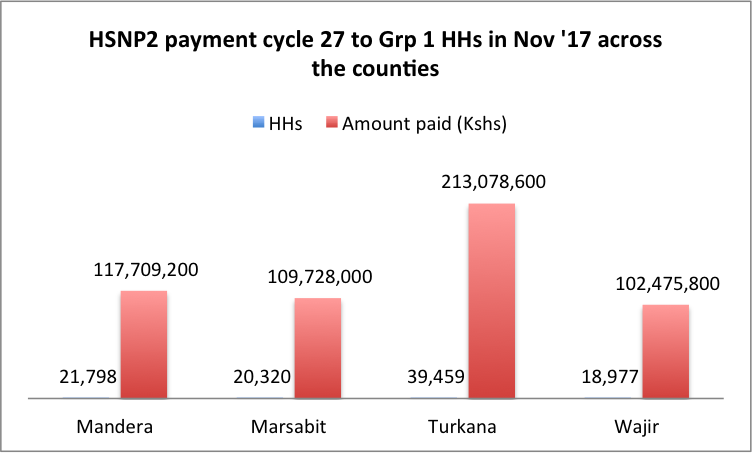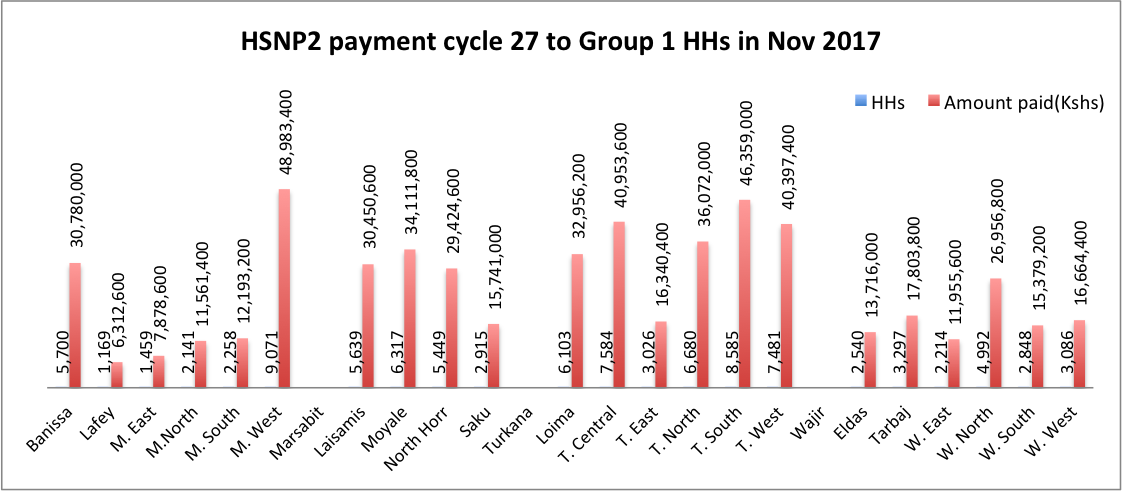 HSNP2 cycle 27 per CountyOn 8th November 2017, HSNP2 delivered Kshs 0.54 billion (£ 3.99million) to 100,554 households (603,324people)across the four arid counties of Turkana, Mandera, Wajir and Marsabit as payment cycle 27. HSNP is an unconditional flagship cash transfer programme that delivers social assistance cash transfers to poorest and most vulnerable households with an aim of reducing extreme poverty and hunger. The cash transfers are delivered in two fold: 1) regular bimonthly to 101,800 Group 1 considered the poorest under the poverty ranking 2) drought emergency scale-up to additional households, Group 2. HSNP is funded by the Governments of Kenya and the United Kingdom (UKAID).
HSNP2 cycle 27 per CountyOn 8th November 2017, HSNP2 delivered Kshs 0.54 billion (£ 3.99million) to 100,554 households (603,324people)across the four arid counties of Turkana, Mandera, Wajir and Marsabit as payment cycle 27. HSNP is an unconditional flagship cash transfer programme that delivers social assistance cash transfers to poorest and most vulnerable households with an aim of reducing extreme poverty and hunger. The cash transfers are delivered in two fold: 1) regular bimonthly to 101,800 Group 1 considered the poorest under the poverty ranking 2) drought emergency scale-up to additional households, Group 2. HSNP is funded by the Governments of Kenya and the United Kingdom (UKAID).
HSNP2 impact evaluation study conducted in 2016 revealed interesting findings on the use of HSNP cash transfers by the beneficiaries. Feedback from HSNP households disclosed that the bulk of the cash goes towards buying food for household consumption. Further, HSNP cash enables the households’ to increase the frequency and portions of meals per day as compared to non-HSNP households. On payday, many beneficiaries buy “bulk” quantities of stables that include: cooking oil, beans, rice, spices, tealeaves, maize and maize floor and this is reflected by the vibrancy of local markets. HSNP cash transfers also assist the households to improve on dietary diversity, as they are able to buy “luxury” items like meat and vegetables in small quantities. Further, the households are able to buy milk for a longer period for daily consumption thus meeting the nutritional requirements of vulnerable households members like children and the elderly. HSNP cycle 27 across the sub-Counties
HSNP cycle 27 across the sub-Counties
HSNP cash is also used to re-pay credit and has increased the “credit-worthiness” of the beneficiaries as it enhances the ability to borrow from friends, neighbors and local traders. Ability to access credit is important for consumption smoothing effects. Households can access food and other households’ essentials on credit as they wait for the next payment. Beneficiaries also use a portion of HSNP cash to pay school fees and meet educational costs (uniforms, shoes, books, school supplies, exam fees) thus improving access to education for children from poorest household and especially orphans and children of widows. Additionally, feedback from respondents that include teachers reveal that children from HSNP households recorded high school attendance, as they were less likely to engage in child labour. HSNP cash reduces the pressure of households to engage their children in income generating.
There are beneficiaries that share that they use HSNP cash for home improvement such as improvement of house structure e.g. roofing with corrugated metal sheets, cement for flooring and constructing additional rooms. Others purchase of household items such as utensils, stools and beddings. There are a few beneficiaries that are able to save a portion of their cash over a period of time to buy small livestock mostly sheep and goats. The ability to buy and maintain assets in form of livestock remains an important issue across the four counties where forms of pastoralism are the main source of livelihood.
A quick analysis on the use of HSNP cash transfers by the beneficiaries indicate that the programme is supporting the realisation of socio-economic empowerment of the poorest and vulnerable people as specified under the social pillar of Vision 2030. One of the flagship projects under the social pillar is the establishment of a consolidated social protection fund implemented through the National Safety Net Programme (NSNP) that has four National cash transfer programmes including HSNP. The aim of NSNP is boost economic empowerment of vulnerable groups through social assistance cash transfers.
Compiled by
Carrie Ndoka- Communications Specialist (HSNP2)
